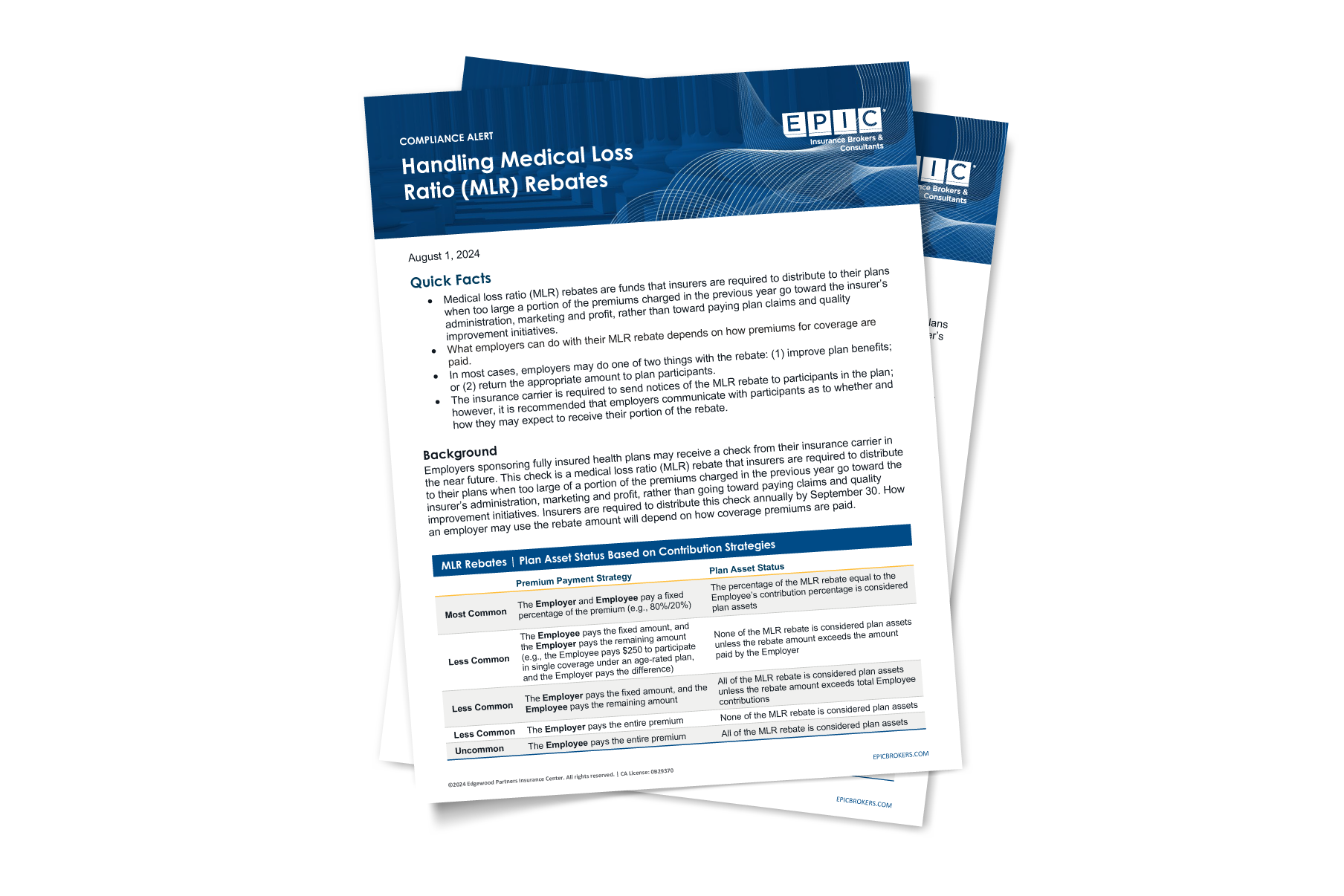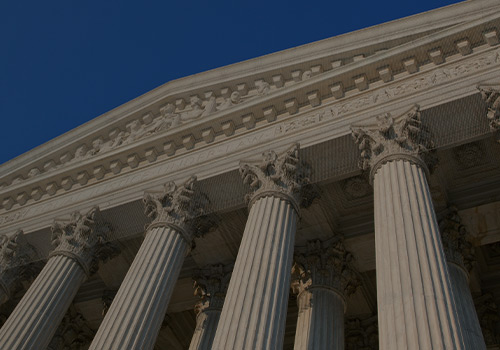Let our team help you navigate the ever-changing benefits compliance landscape each month. Check out this month’s latest alerts, additional updates, and resources hot off the press:
Employee Benefits Compliance Alerts
This month’s Compliance Matters newsletter provides a comprehensive review of the following topics. To obtain your copy, please use the form below to download.

- Medicare Part D Redesign May Affect Creditable Coverage Status
- Final HIPAA Rules for Reproductive Healthcare
- Departments Provide Final Rules for ACA Section 1557
- Special Alert: IRS Releases 2025 Limits for HDHPs & HSAs
- Update on California A.B. 2200 Single-Payer System Bill
- 2024 State Regulation Series: California Requires FSA Termination Notice
Download this month’s alerts
Additional Updates & Resources
Departments Provide Update on Advanced EOB Requirements
The Department of Health and Human Services (HHS) recently released an update on progress surrounding Advanced Explanation of Benefits (AEOB) requirements.
The Consolidated Appropriations Act of 2021 (CAA) requires healthcare providers to provide an individual’s health plan participant a good faith estimate of the expected charges for furnishing an item or service upon scheduling or at the participant’s request. Once a good faith estimate is received, health plans must send the plan participant an AEOB that includes information such as a provider’s network status and an estimate of the amount the plan is required to pay. In August 2021, through frequently asked questions (FAQs) part 49, the Departments delayed enforcement of the AEOB and good faith estimate requirements, citing complexities in infrastructure for data transmission between providers and insurers and stating that they will provide additional rulemaking in the future.
In the April 2024 update, HHS explained that they are evaluating acquired information and industry feedback and intend to develop proposed rules on good faith estimates and AEOBs for insured individuals.
Final Rules for Association Health Plans
Agency rules released in 2018 provided a path for small employers and working owners to form association health plans (AHPs) that could offer a large group health plan to members who otherwise would have been required to offer small group market coverage. In addition, the rules allowed the AHPs to be treated as a single plan for Employee Retirement Income Security Act (ERISA) purposes rather than treating each participating employer as a separate ERISA plan sponsor.
In 2019, a federal district court in Washington, D.C. invalidated portions of the final rule, removing the expanded AHP option. Recently, agencies released clarifying regulations, along with a Department of Labor announcement, that formally rescind the 2018 AHP rules and confirmed that in most cases, when unrelated entities offer shared benefits via a multiple employer welfare arrangement (MEWA), the coverage available for a participating member will be based on that particular member’s size, and each participating member will be seen as sponsoring their own separate group benefit plan(s). For the vast majority of employers, these rules will not have any impact, and employers participating in established, industry-based AHPs should be compliant under the pre-2018 rules. The formal repeal of the 2018 AHP rules reinforces that it is generally difficult for unrelated employers to join together to offer coverage to their employees.
DOL Fiduciary Rules Include Health Savings Accounts
On April 25, 2024, the Department of Labor (DOL) released final regulations and a fact sheet defining “investment advice” for fiduciary purposes under the Employee Retirement Income Security Act (ERISA). The Department’s final rule provides that a financial services provider will be an investment advice fiduciary under federal pension law if:
- the provider makes an investment recommendation to a retirement investor;
- the recommendation is provided for a fee or other compensation, such as commissions; and
- the financial services provider holds itself out as a trusted adviser by
- specifically stating that it is acting as a fiduciary under Title I or II of ERISA; or
- making the recommendation in a way that would indicate to a reasonable investor that it is acting as a trusted adviser making individualized recommendations based on the investor’s best interest.
Under the definition in the final rules, “retirement investors” include health and welfare plans and health savings accounts (HSAs). Accordingly, HSA providers are not making a recommendation subject to the final rules if the provider uses only objective third-party criteria to help plan sponsors and fiduciaries select and monitor investment options and do not offer personalized recommendations based on investor interests. Entities that administer HSAs will need to rely on Department prohibited transaction exemptions (PTEs) to address any conflicts of interest with respect to advice. Notably, the DOL will permit IRS-approved non-bank trustees and custodians to utilize relief outlined in the PTE guidance PTE 2020-02 when they are acting as trustees or custodians for HSAs.
EPIC is monitoring these new rules and will continue to provide updates and guidance as more information becomes available.
Reminder! PCORI Fee Due July 31
Employers who sponsored self-funded medical plans that ended sometime during 2023 are required to report and pay the ACA Patient-Centered Outcomes Research Institute (PCORI) fees no later than July 31. Fully insured plan sponsors can rely on their carriers to submit the fee on their behalf, but fully insured plan sponsors that sponsor a self-funded plan component such as a health reimbursement arrangement (HRA) or a flexible spending account (FSA) will need to file and pay for the self-funded component plan.
Payment amounts due in 2024 will differ based on the employer’s plan year. The IRS put together a chart showing applicable fee amounts depending on the plan’s year end date. The fees due in July 2024 are as follows:
- $3.00 per covered life for plan years ending after September 30, 2022, and before October 1, 2023
- $3.22 per covered life for plan years ending after September 30, 2023, and before October 1, 2024
Self-funded plans may use one of three methods to determine the average covered lives used for reporting and paying the PCORI fee: (i) the actual count method; (ii) the snapshot method; or (iii) the Form 5500 method. There are special counting rules that apply to employers offering multiple self-funded plans or a health reimbursement arrangement (HRA) integrated with a fully insured plan. The PCORI fee count and payment are submitted using the IRS Form 720.
Reminder! Form 5500 Due July 31 for Calendar Year Plans
Employee health and welfare plan administrators with at least 100 participants must file an IRS Form 5500 each year by the last day of the seventh month after the end of the plan year. This means plan sponsors with calendar year plans must file annually by July 31.
Plan sponsors may file an extension, which delays the annual filing deadline for calendar year plans to October 15. Get more information about filing Form 5500.

More Compliance Resources
- Sign up for our in-depth 2024 Compliance Webinars
- Learn about our Compliance Consulting Services

WANT TO GET COMPLIANCE MATTERS IN YOUR INBOX?
Sign up for the monthly newsletter.
